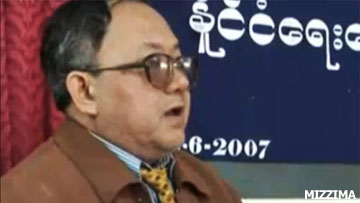(Interview) – Col. Khun Okkar, the Pa-O National Liberation Organization (PNLO) chairman, has said it is not true that the Shan State Progressive Party (SSPP) has sent a resignation letter to the recently formed United Nationalities Federal Council (UNFC), an organization of 12 ethnic armed opposition groups. Originally, in 2010 six armed ethnic groups formed an alliance called the Committee for the Emergence of a Federal Union (CEFU). Its membership was extended to 12 organizations in February 2011, and the CEFU was abolished to reform as the UNFC.
(Interview) – Col. Khun Okkar, the Pa-O National Liberation Organization (PNLO) chairman, has said it is not true that the Shan State Progressive Party (SSPP) has sent a resignation letter to the recently formed United Nationalities Federal Council (UNFC), an organization of 12 ethnic armed opposition groups. Originally, in 2010 six armed ethnic groups formed an alliance called the Committee for the Emergence of a Federal Union (CEFU). Its membership was extended to 12 organizations in February 2011, and the CEFU was abolished to reform as the UNFC. A Thailand-based independent news agency, the Shan Herald Agency for News (SHAN), reported on April 21 that an SSPP officer said that it will join the alliance as an observer. Mizzima reporter Ko Wine talked with Col. Khun Okkar about the recent developments.
Question: The United Nationalities Federal Council (UNFC) structure will be reformed. Can you describe the new structure?
 Answer: We have abolished the CEFU and transformed it into the UNFC. I think we may officially approve the new structure next month.
Answer: We have abolished the CEFU and transformed it into the UNFC. I think we may officially approve the new structure next month.
Q: Aren't you personally involved in the restructure?
A: No. First, me and Nai Han Tha drafted the structure, but the members had questions. Then a body modified the structure. When it will be discussed and voted on, we may take part again.
Q: How will the reformation be accomplished?
A: After the conference, a supreme council member meeting was held with top leaders from all parties and people from important organizations. As it is a supreme body, it has authority to reform it but it must be officially endorsed by the all-party conference. It needs approval from all member organizations, maybe next month.
Q: How will the structure be changed?
A: Basically, it is the leadership structure that will be reformed. In the original format, there were three tiers: a political body with chiefs from all member organizations and all states. The second tier is from all federal council members and it looks like a central committee. Then we select people to lead an executive body from the federal council members. The new structure is formed by taking out a layer of leadership. We think the supreme leading body is not necessary, as it may not have a clear function.
Q: How will the new structure be based?
A: It is based on ethnic nationalities, and we also recognize ethnic parties as well. If an ethnic nationality has two parties, both can be members. We want to create a broad-based alliance. In leadership structure, we keep all the strong parties' leaders to be effective. They control a big area and have large memberships and rich organizations.
Q: Is it true that the SSPP has resigned from the ethnic alliance?
A: It seems like they want to re-negotiate the structure. They sounded us out as if they may resign from the UNFC, but officially we didn’t receive any letter.
Q: Do you mean that the SSPP wants the UNFC structure to represent ethnic states?
A: Yes. There is no problem in Kachin, Chin, Karenni and Karen states. But in Shan State, Pa-O, Palaung, Wa, and Lahu–four organizations–they have separately joined the alliance and the Shan want to re-negotiate their position on that. They prefer all ethnic parties from Shan State to be represented in one group.
Q: Some people are saying the SSPP representatives will come from its central committee?
A: The situation looks like this. For the SSPP membership, it must be endorsed by the mother organization. I can confirm that the mother organization, SSPP, will continue to exist as a member of UNFC. But they may have difficulty in creating council member and executive member lists.
Q: How will a 'federal’ council member be selected?
A: A council member is nominated by the group when it applies for UNFC membership. The group needs to submit two members; one for the military area and one for the political area. Some groups send four delegates, and then the executive body selects the council members from among them.



